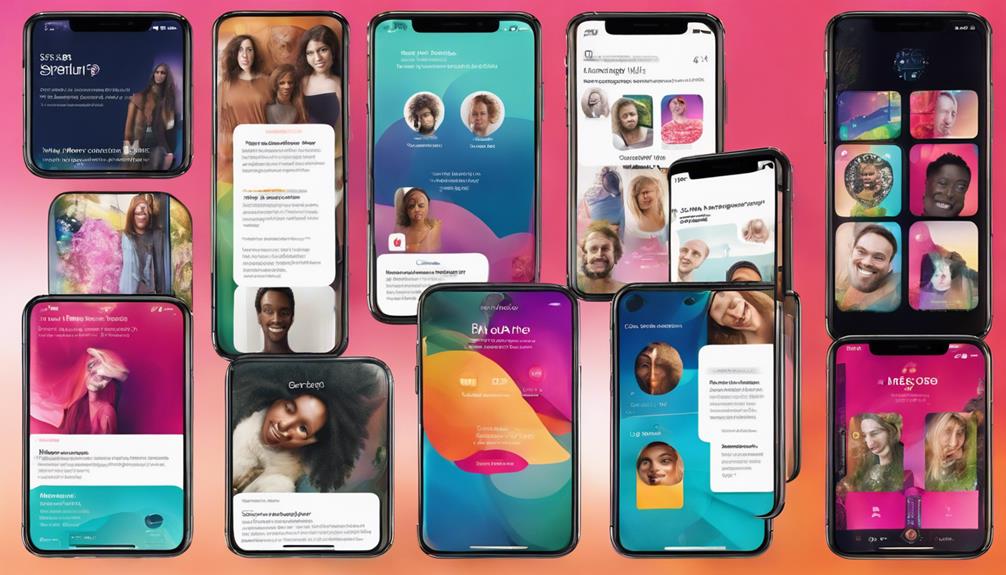In a recent situation, a couple in a non-monogamous relationship experienced jealousy when one partner began spending more time with a new love interest. Handling jealousy in a respectful manner involves recognizing individual feelings and boundaries while promoting security and understanding in the relationship.
By exploring effective communication strategies, practicing empathy, and setting ethical boundaries, couples can navigate jealousy in non-monogamous dynamics with grace and integrity. The complexities of jealousy in these relationships highlight the importance of exploring ethical approaches to ensure the well-being of all involved.
Key Takeaways
- Jealousy in non-monogamy is natural, not a failure.
- Address triggers to resolve underlying issues constructively.
- Communication and transparency are vital in expressing emotions.
- Develop personalized coping strategies based on individual needs.
Understanding Jealousy in Non-Monogamy
In non-monogamous relationships, jealousy is a complex emotion that can profoundly impact us in unexpected ways. It's crucial to approach jealousy with ethical considerations, recognizing that it's a natural feeling that doesn't indicate a failure in the relationship.
Understanding the triggers of jealousy is essential in navigating ethical non-monogamy. By identifying what specifically sparks these feelings, we can work towards addressing them constructively. Communication and transparency play vital roles in this process, allowing us to openly express our emotions and concerns with our partners.
Each individual has unique needs when it comes to managing jealousy, so developing personalized coping strategies is key. These strategies should be tailored to our specific triggers and emotional responses, enabling us to navigate jealousy in a way that aligns with our ethical approaches to non-monogamous relationships.
Communication Strategies for Managing Jealousy

Understanding and effectively managing jealousy in non-monogamous relationships begins with implementing clear and empathetic communication strategies. When dealing with jealousy in open relationships, honest communication and active listening are key. Here are four essential strategies for managing jealousy in consensual non-monogamy:
- Identify Jealousy Triggers: Recognizing what specifically triggers feelings of jealousy can help address underlying issues and insecurities.
- Use 'I' Statements: Expressing jealousy using 'I' statements instead of accusations can foster understanding and avoid blame.
- Practice Empathetic Responses: Responding to jealousy with empathy and compassion can strengthen emotional bonds and build trust.
- Schedule Dedicated Time and Regular Check-ins: Setting aside specific time to discuss jealousy and having regular check-ins with partners can create a safe space for open dialogue and connection.
Cultivating Empathy in Non-Monogamous Dynamics
Cultivating empathy in non-monogamous dynamics involves actively listening to partners' emotions and perspectives, fostering a deeper connection based on understanding and respect. By understanding and validating each other's emotions and perspectives, we create a safe space for compassion and mutual support within our relationships. Empathy plays a crucial role in navigating the challenges and conflicts that may arise in non-monogamous dynamics, allowing us to prioritize emotional well-being and strengthen the bond with our partners.
Through active listening and considering the feelings of all individuals involved, we can build a foundation of trust and understanding that promotes growth and intimacy. By acknowledging and respecting the diverse range of emotions experienced within non-monogamous relationships, we can cultivate a culture of empathy that enhances communication and fosters a deeper connection among partners. Embracing empathy not only helps address jealousy but also nurtures a supportive environment where everyone's emotional needs are valued and respected.
Self-Reflection Techniques for Addressing Jealousy

Exploring our inner vulnerabilities and triggers is key to effectively addressing jealousy in non-monogamous relationships through self-reflection techniques.
When delving into self-reflection to navigate jealousy, consider these essential strategies:
- Identify Personal Triggers: Reflect on specific situations or behaviors that trigger feelings of jealousy within yourself.
- Understand Root Causes: Dive deep into the underlying reasons for your jealousy to develop a clearer understanding of your emotions.
- Journaling Practices: Utilize journaling as a powerful tool to process and explore your feelings of jealousy, aiding in self-discovery and emotional processing.
- Pattern Recognition: Through self-reflection, recognize recurring patterns of jealousy in your reactions, helping you tailor more effective responses.
Implementing Ethical Boundaries in Non-Monogamous Relationships
Navigating ethical boundaries in non-monogamous relationships requires a foundation of clear communication and mutual respect among all partners involved. Establishing and respecting boundaries is crucial for creating a safe and secure environment where everyone feels valued and understood. Openly discussing boundaries helps in preventing misunderstandings, conflicts, and breaches of trust, fostering a culture of consent, trust, and respect within the relationship. By addressing jealousy triggers and emotional boundaries through effective communication, partners can navigate challenges together, strengthening their bond and emotional safety.
| Ethical Boundaries in Non-Monogamous Relationships | ||
|---|---|---|
| Key Aspects | Importance | Impact |
| Clear Communication | Ensures understanding | Prevents conflicts |
| Mutual Respect | Values each partner | Fosters trust |
| Consistent Revisiting | Maintains relevance | Enhances emotional safety |
Frequently Asked Questions
How Do You Deal With Jealousy in Ethical Non-Monogamy?
We manage jealousy in ethical non-monogamy by acknowledging our feelings and openly discussing them with our partners. This fosters trust and understanding, allowing us to address insecurities together.
How Do You Deal With Jealousy in Polyamory?
In polyamory, we manage jealousy by acknowledging our triggers and insecurities, fostering open communication with partners, and developing personal coping strategies.
By focusing on the positive aspects of each relationship and practicing self-care, we can navigate envy and build trust.
Seeking professional help and maintaining a support system are vital components in handling jealousy within polyamorous dynamics.
It's about understanding ourselves and our connections to create a harmonious and fulfilling experience.
What Is the Opposite of Jealousy in Non-Monogamy?
We feel that the opposite of jealousy in non-monogamy is compersion. It's a beautiful feeling where we find joy in our partner's happiness with others.
Compersion brings us closer, promotes understanding, and nurtures emotional growth. Witnessing our partner's connections fills us with happiness and fulfillment, fostering intimacy and trust.
Embracing compersion can truly enhance our relationships and bring us closer together in our non-monogamous journey.
How Do You Process Jealousy in an Open Relationship?
When processing jealousy in an open relationship, we prioritize open and honest communication with our partners. Understanding the root causes of jealousy helps us address triggers effectively.
What are the common causes of jealousy in ethical non-monogamous relationships and how can it be addressed?
Jealousy can arise in ethical non-monogamous relationships due to various reasons, such as fear of abandonment, insecurity, or feelings of inadequacy. Addressing it requires open communication, setting clear boundaries, and practicing self-reflection. Here are some tips for married nonmonogamy to tackle jealousy and nurture healthy relationships: prioritize emotional support, embrace compersion, engage in regular check-ins, and seek professional guidance if needed.
Conclusion
As we navigate the complexities of jealousy in non-monogamous relationships, we must remember that trust and communication are key.
It's ironic how jealousy, a natural emotion, can actually strengthen our connections when addressed with honesty and empathy.
By embracing our vulnerabilities and working together to overcome challenges, we can create a foundation of love and understanding that transcends jealousy's grip.
Remember, it's the journey of growth and self-discovery that truly defines our relationships.
Augustus is the visionary leader and Editor-in-Chief of Personality-Test.net. With an unwavering commitment to quality and authenticity, he oversees all content, ensuring it enlightens and empowers our audience. Augustus believes deeply in the transformative power of self-awareness and is dedicated to making Personality-Test.net a beacon for those on a journey to understand themselves better.










